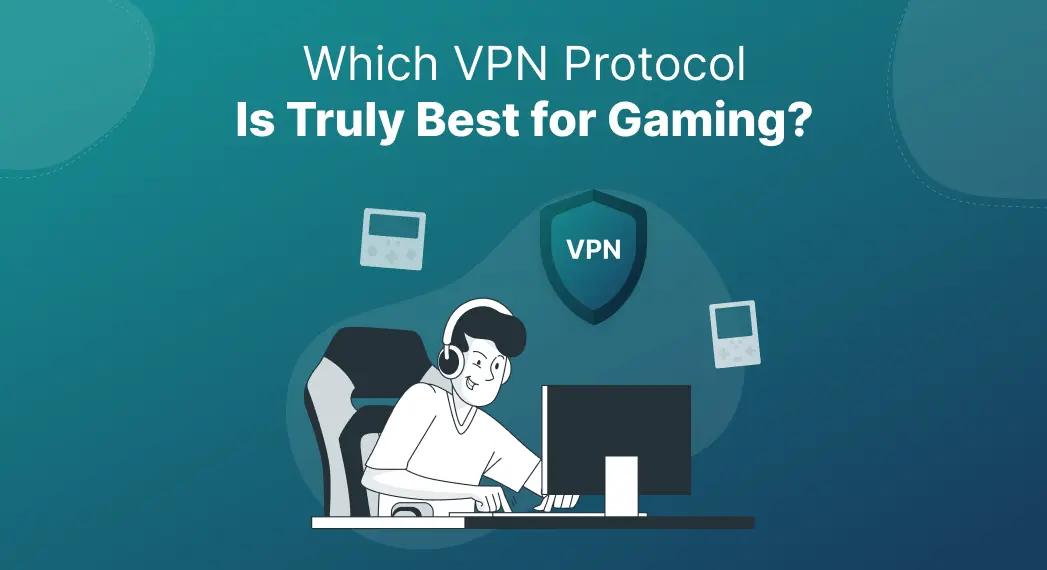Which VPN Protocol Is Truly Best for Gaming? Your Ultimate 2025 Guide
Date 23 Aug, 2025
By Neo

- What is a VPN Protocol?
- Top VPN Protocols for Gaming
- IKEv2/IPSec: Stability and Connectivity for Mobile Gamers
- L2TP/IPSec: Easy Setup but Older Technology
If you’re a passionate online gamer, you know how crucial every millisecond of latency is. A fast, stable, and secure VPN connection can make all the difference between victory and defeat. But not all VPN protocols are created equal when it comes to gaming performance. Selecting the right VPN protocol can dramatically reduce lag, improve ping times, and protect your connection from cyber threats—without compromising speed.
In this guide, we’ll break down the best VPN protocols that gamers should consider for an optimal gaming experience. From the ultra-fast and lightweight WireGuard to the reliable IKEv2/IPSec and the widely-used L2TP/IPSec protocols, we’ll cover the strengths and weaknesses of each. Whether you’re looking for the best speed, strongest security, or lowest latency, understanding how these protocols work will help you choose the perfect VPN setup for online gaming.
Dive in to discover which VPN protocol is truly the best for gaming, offering the perfect balance of speed, security, and responsiveness.
What is a VPN Protocol?
A VPN protocol is a set of instructions that helps your device and a VPN server communicate safely when you use a VPN. When you use the internet without a VPN, hackers or your internet provider can openly see your data as it travels. But when you use a VPN, it sends your data through a secret, encrypted tunnel that hides and protects it. The VPN protocol controls how this tunnel forms and how your information moves safely inside it.
Imagine you want to send a letter to your friend, but you don’t want anyone else to read it. The VPN protocol is like a special way of locking the letter in a strong, secret box before sending it. Only your friend has the key to open the box and read the letter. So, the protocol is important because it makes sure your information stays safe and private.
There are different types of VPN protocols, and they work in different ways. Some focus on keeping your data super secure, while others try to make your internet connection faster. This means you might want a protocol that keeps your data very safe, or one that lets you watch videos without slowdowns. Your VPN uses these protocols to decide how to protect your information and how fast your internet works.
Top VPN Protocols for Gaming
Choosing the right VPN protocol is essential for an excellent gaming experience. The best protocols help deliver low latency, strong security, and stable connections. Let’s take a closer look at three of the top VPN protocols for gaming: WireGuard, IKEv2/IPSec, and L2TP/IPSec.
| Feature | WireGuard | IKEv2/IPSec | L2TP/IPSec |
| Speed & Latency | Up to 1000 Mbps | Up to 600 Mbps | Up to 100 Mbps |
| Connection Stability | More stable | Extremely stable | Stable |
| Security & Encryption | ChaCha20, Curve25519, BLAKE2s, Public-key cryptography | AES-256, ChaCha20, Camellia, Diffie-Hellman key exchange | AES, 3DES, Blowfish encryption |
| Authentication | Noise protocol handshake | Digital certificates, PSK, RSA signature | PPP, PAP, CHAP, NCP |
| Device Compatibility | Cross-platform (Windows, macOS, iOS, Android, BSD) | Cross-platform (Windows, macOS, iOS, Android, BSD) | Cross-platform (Windows, macOS, iOS, Android) |
| Bypass Geo-blocks | No | Yes, with SmartDNS | No |
WireGuard: A Modern Protocol Designed for Speed and Security
WireGuard has rapidly gained traction as one of the best VPN protocols for gaming. It is a lean, open-source protocol that has been built from the ground up to prioritize speed and efficiency. Unlike many legacy VPN protocols, WireGuard uses a much smaller codebase, which reduces complexity and enhances security audits, making it a reliable VPN protocol for gamers concerned about privacy and performance.
Its use of cutting-edge encryption like ChaCha20 provides strong protection without slowing down connections. This focus on efficiency translates to extremely low latency and faster connection times, both essential for a seamless gaming experience. Whether you are engaged in competitive fast-paced shooters or large-scale multiplayer games, WireGuard’s design helps ensure you experience less lag and smoother gameplay.
Another advantage of WireGuard is its broad compatibility with all major operating systems, including Windows, macOS, Linux, Android, and iOS. On mobile devices, its lightweight nature conserves battery life and speeds up reconnections, making it ideal for gaming on the go.
One thing to note is that WireGuard currently only operates over the UDP protocol and doesn’t support port 443, which can sometimes cause difficulties in environments with strict network restrictions or firewall rules. In rare cases, users might experience packet loss, but the protocol continues to evolve and improve.
Overall, WireGuard stands out as a fast and secure VPN for gaming, balancing excellent security with minimal impact on connection speed, making it a go-to option for gamers wanting the best online experience.
IKEv2/IPSec: Stability and Connectivity for Mobile Gamers
IKEv2/IPSec is another highly regarded VPN protocol that combines strong encryption with resilience, particularly when switching networks. This makes it a favorite among mobile gamers who transition between Wi-Fi and cellular data during gameplay or while streaming game content.
Thanks to robust 256-bit AES encryption, IKEv2/IPSec offers solid security protecting gamers from threats like DDoS attacks that can disrupt online sessions. One standout feature is its ability to reconnect seamlessly if the connection drops or network changes happen, ensuring minimal disruptions to gameplay.
While it generally delivers fast speeds and low latency suitable for most gaming needs, some networks can block its use of UDP port 500, which may limit access in restrictive environments. Additionally, IKEv2/IPSec is not open-source, so some users may have concerns about transparency, but it remains a great VPN protocol for gaming in terms of security and reliability.
IKEv2/IPSec supports all major platforms and is widely used in environments where both speed and steady performance are priorities. For gamers who value consistent connectivity and secure multiplayer sessions, it serves as an excellent option.
L2TP/IPSec: Easy Setup but Older Technology
L2TP paired with IPSec is a well-established protocol combination that offers a secure way to tunnel data across the internet. It supports a wide range of devices and operating systems and often comes as a default option, making it a popular choice for users who value convenience and easy setup.
L2TP/IPSec protocol creates a protected data pathway with encryption, enhancing online security during gaming sessions. However, because L2TP encapsulates data twice (first with L2TP and then with IPSec encryption), it tends to be slower and introduces higher latency. These factors can negatively impact fast-paced or competitive games where every millisecond counts.
Most devices support L2TP/IPSec, and it’s easy to set up. However, during serious gaming, it can slow down your connection and cause lag. Therefore, it works better for casual gaming or as a backup option.
Additionally, ISPs and firewalls often block L2TP/IPSec, which can cause connection problems for gamers. Moreover, it uses fixed passwords that can make it less secure compared to newer VPN protocols with better security methods.
Although it may not be the best VPN protocol for advanced users seeking the lowest ping and fastest speeds, L2TP/IPSec remains a reliable fallback for gamers new to VPNs or those who need a simple, stable, and secure connection for casual gameplay.
How to Choose the Best VPN Protocol for Gaming
Choosing the right VPN protocol is important to get the best gaming experience. A VPN protocol controls how your device connects to the VPN server and how your data stays safe and fast. Here’s what to look for when picking the best VPN protocol for gaming:
Speed and low latency: First, look for speed and low latency. Gaming needs fast connections and low delay (called latency or ping). The best VPN protocols for gaming reduce lag so your actions happen quickly. WireGuard and similar protocols deliver fast speeds and very low latency, making them great for gaming.
Security and encryption: Next, think about security and encryption. Your VPN protocol should keep your game data safe from hackers and protect you against attacks like DDoS, which can crash your game. Protocols like OpenVPN offer strong encryption, but they might slow down your connection. Balancing good security with speed is key.
Connection Stability and Reliability: You should also consider the stability and reliability of the connection. Gaming needs a steady connection without sudden drops. When your internet disconnects, IKEv2/IPSec swiftly restores your connection, preventing you from losing the game.
Compatibility and Ease of Use: Another important point is compatibility and ease of use. Some protocols are built into many devices and easy to set up, like IKEv2. Others, such as OpenVPN, might require extra software. Make sure the protocol you pick works smoothly on your gaming device, whether it’s a PC, smartphone, or console.
Trust and Privacy: Also, check the reputation of the VPN provider and whether they keep logs of your activity. A VPN that doesn’t log your data protects your privacy better. Look for VPNs audited by independent experts to make sure their security claims are trustworthy.
The best VPN protocol for gaming should provide a good mix of speed, security, and connection stability. WireGuard is often the top choice for fast and smooth gameplay. IKEv2/IPSec is great if you value quick reconnections, especially for mobile gaming. OpenVPN gives strong security but may be slower. Always choose a protocol that fits your gaming needs and keeps your data safe.
Why UDP is the Preferred Protocol for Gaming VPNs
For gaming, UDP (User Datagram Protocol) is generally preferred because it offers faster, low-latency connections suitable for real-time gameplay. Most gaming VPN protocols like WireGuard and IKEv2 use UDP. On the other hand, TCP (Transmission Control Protocol) is more reliable in delivering data but can slow down communication, which may cause lag in games.
Frequently Asked Questions
What should I look for in a gaming VPN?
When choosing a gaming VPN, focus on low latency and fast connection speeds by selecting VPNs with servers near popular game servers. Look for providers offering dedicated or optimized gaming servers and support for fast protocols like IKEv2 or UDP. The VPN should balance strong encryption with minimal overhead to avoid slowing down your connection. It is also important to pick a VPN with reliable performance, no overcrowded servers, and minimal impact on your system resources and game frame rates.
Is IKEv2 Faster Than UDP?
IKEv2 is generally considered faster and more efficient than OpenVPN over UDP for gaming due to its low CPU usage and quick connection setups. While UDP prioritizes speed by reducing error checking as a transport protocol, IKEv2 balances speed and security effectively as a VPN protocol, making gamers choose it often. Although actual speeds vary depending on setup and network conditions, many gamers find that IKEv2 delivers smoother and quicker gameplay compared to OpenVPN running over UDP.
Does VPN Decrease FPS?
VPN may decrease FPS on some systems because the encryption and data processing involved consume CPU and network resources, possibly limiting your device’s ability to render game frames smoothly. While high-end gaming systems usually experience little to no FPS drop, less powerful devices or inefficient VPN software can cause noticeable performance declines. Selecting a lightweight and optimized VPN helps minimize any negative impact on frame rates during gaming.
Is OpenVPN a good choice for gaming?
OpenVPN is known for its strong security and reliability, making it a solid choice for gaming in terms of protection. However, it can be more resource-intensive and slower compared to other VPN protocols, potentially increasing latency and negatively affecting game performance. Gamers prioritizing speed and low latency often prefer alternatives like IKEv2 or WireGuard, which offer faster speeds and lower CPU usage.
